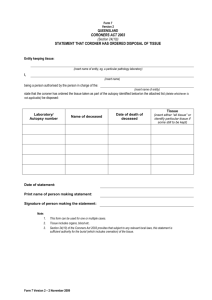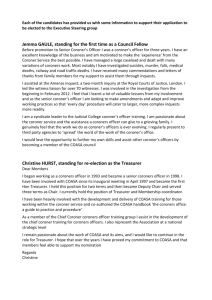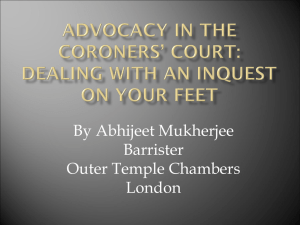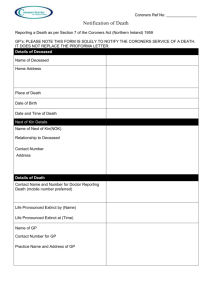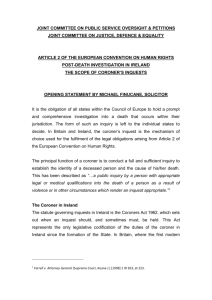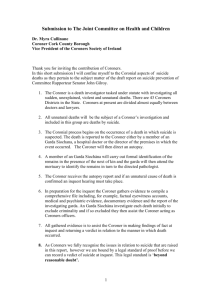HM Coroner Derek Winter City of Sunderland
advertisement
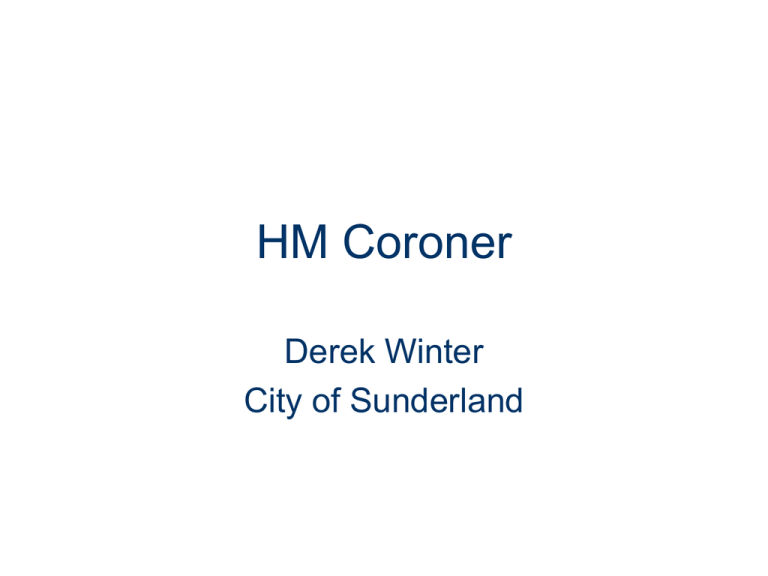
HM Coroner Derek Winter City of Sunderland Thoughts for Today • The Coroner and Justice Bill 2009 • Corporate Manslaughter and Corporate Homicide Act 2007 • The Road Safety Act 2006 • The future of Forensic Pathology? Handouts • • • • • • The Work of the Coroner When Sudden Death Occurs Understanding CMCHA 2007 A Guide to CMCHA 2007 Circular 2008/03 Road Safety Act 2006 Draft Charter for Bereaved people who come into contact with a reformed Coroner System • Coroner Reform Bulletin (2) April 2009 • What to do after a death • R-v-Evans[2009] EWCA Crim 650 “The Coroner frequents more public houses than any man alive. The smell of sawdust, beer, tobacco-smoke and spirits is inseparable in his vocation from death in its most awful shapes” Charles Dickens Bleak House ch11 2007 • • • • • • • 504,300 deaths in England Wales 234,500 referred to the Coroner (46%) 110,400 subject to PM (47%) 30,800 Inquests (13%) 2946 traffic fatalities 750 homicides (75% male) 3000 suicide verdicts (80% male) Coroner Service Funded by LA (s27 indemnity) 104 Coroners (Deputies & Assistant Deputies) Police Coroners Officers (Police Staff) Corporate Manslaughter Basics • An Organisation will be guilty if the way in which its activities are managed or organised (at a senior level) causes a death and amounts to a gross (far below) breach of a duty of care to the deceased CMCHA 2007 Section 8 (3) • • • • • • The Jury may also consider the …. Attitudes Policies Systems Accepted Practices ….that were likely to have encouraged the breach or produced a tolerance of it Practicalities • Investigate Sudden and Unexplained Death • Refer to the Police prior to or during Inquest for Gross Negligence Manslaughter and now Corporate Manslaughter to consider • • • • Employers Local Authority Doctors Pharmacists (NB Govt estimates were for 10/12 prosecutions pa) Problems • Do we need a forensic autopsy in more/all cases? • 2nd PM? • Police/CPS views? • Delay • Family never get a chance to be heard Expectations • Inquests are not: • A dry run for a civil hearing to determine liability • To adjudicate complaints Inquests determine who the deceased was when and where they died and how they came about death BUT…… Pressures • Confusion with Neglect v Negligence • Neglect is a gross failure to provide basic nourishment/medical treatment (Jameson) • Unlawful Killing Verdict has to be beyond reasonable doubt • Cannot apportion blame (r42 CR84) • No self incrimination (r22 CR84) More Pressures • • • • • • • • Ordinary PM (£90) Independent PM (£300) HO Forensic PM (£2500) “defence” PM ? Police resources Disclosure/Statements/Policies/Experts Delays Scope of the Inquest/Jury? And More! • Who is a manager at a senior level in a medical death? • Appointment/supervision/training/review of staff • Procedures-review and audit • Volume of NHS instructions to Trusts • Causation • Emergency response versus medical treatment • Longer case-delays with routine work • Reluctance to provide full reports for fear of disclosing criminal liability. • Conflicts of interest • More lawyers • Rule 43 reports The Road Safety Act 2006 s20 Causing death by Careless or inconsiderate driving: “A person who causes the death of another person by driving a mechanically propelled vehicle on a road or other public place without due care and attention, or without reasonable consideration for other persons using the road or place, is guilty of an offence." s21 Causing death by driving: unlicensed,disqualified or uninsured drivers Mandatory adjournment under s16 Coroners Act 1988 (both for Magistrates and Crown Court) Inquest may be resumed after the criminal proceedings are concluded if in the Coroners opinion there “is sufficient cause to do so” Re-trial? Sentencing issues-further evidence-family to be heard Chief Medical Officer Guidance • 1998 “All those who have information which could help Coroners inquiries should disclose it voluntarily and not only when requested” • 2008 “NHS organisations should aim to assist Coroners by providing prompt access to information that may be relevant to an Inquest. Where an organisation takes the decision to withhold information from an inquiry, this should be clearly documented with an explanation of the considerations that are believed to outweigh the public interest that would be served by disclosure” • Coroners will not be playing “hide and seek” with NHS organisations and will look very seriously at contempt of Court and/or attempting to pervert the course of justice The Coroners and Justice Bill 2009 • • • • • • • • • • Chief Coroner (High Court Judge) Leadership Training and Guidance Annual report Support for Coroners Rule 43 reports-collating and publishing Case Law Consultation/involvement with Coroner appointments Liaison with relevant organisations Inspections (operation/standards of service not Judicial functioning) • Appeals (on fact and law) • Directing other Coroners to conduct investigations • Applications where no body exists …and more • • • • • • • • • Applications for search and entry Retention/release of bodies Investigation of (non judicial) complaints Conducting an Investigation Designation of medical practitioners Emergency Planning Issuing Practice Directions to Coroners Identifying and disseminating best practice to Coroners Determining how the standards of service in the Charter for Bereaved People will be applied • Liaison with other stakeholders HMICA: LGA: Audit Commission A Poisoned Chalice Death Certification • Improve the quality and accuracy • Effective medical scrutiny of all deaths not reportable to the Coroner • Transparency for bereaved families • Strengthen clinical governance/public health surveillance Medical Examiners • Scrutinise and confirm cause of deaths (not investigated by the Coroner) • Talk with the next of kin and others to prepare for scrutiny and after scrutiny to advise the confirmed cause of death • Where there is no attending doctor the ME will scrutinise the death and prepare the MCCD • ME Authorisation will replace the current cremation forms and apply to burials also • ME Authorisation will be transmitted to Bereavement Office/GP/Funeral Director and Disposal Authority Impact • • • • • • Bereaved Families Simpler process Increased transparency Confirmed cause of death explained Easier to raise concerns Improved quality of certification Doctors • Access to ME for discussion • Improved quality of certification • Reduced bureaucracy Funeral Directors • Less time/work involved with forms • Notification of confirmed cause of death helps to meet health and hygiene requirements Coroners • • • • • Fewer Investigations Reduced post mortems Medical Advice available from ME The ability to transfer cases to other jurisdictions The legalisation of the practice of transferring bodies for PM’s to other jurisdictions • To hear cases outside of the jurisdiction • Leadership Some problems • CO’s may migrate to ME service (blight) • Independence of the ME to the PCT who appoints them? • Pilots underway with staged roll out by 2011 • DoH awash with funds • MoJ National leadership via Chief Coroner to be funded centrally but LA continue to fund the Coroner service although there will be a move to full time Coroners and larger jurisdictions (population areas 1m save for geographical anomalies) • No new money for LA’s to meet higher expectations Resources • • • • Demand led service Statutory duty to investigate S27 indemnity now and in the new Act Full cost falls to LA (impact on other essential services) • No Budget (resource allocation/expenditure forecast) • Judicially independent of funding LA • Failure to fund = breach of statutory duty/Contempt/Obstructing Justice If Coroners get it wrong….. • • • • • • • • • A missed murder and possibly more deaths Incorrect ID Release of the wrong body PM on the wrong body Wrong information to the right relative Failure to advise on tissue retention Failure to deal with retained tissue correctly Failing to spot something that may kill others The CSEW welcomes the reforms (even though they have been watered down ) • The devil will be in the detail of the regulations and the resources applied Registrars • Reduced bureaucracy • No requirement to interpret medical information • Easier to monitor and manage workload Rising costs (1) • Whilst autopsies have come down in % terms, the number of reported cases increases each year • The complexity and length of cases has increased beyond reason in the last few years: – increased public expectation – effects of Article 2 ECHR – greater risk of challenge in the High Court • More second autopsies where the costs must be met by the coroner Rising costs (2) • The NHS used to work with the coroner, covering much of the costs that the case incurred • Then they needed to recover funds …. • Sudden infant deaths – used to cost only a minimal pathologists fee – now we pay for everything • Toxicology – used to cost £5 for an alcohol test – now we have to do a wide ranging screen – Now far more cases where toxicology is needed Rising costs (3) • The profile of the inquest has risen significantly, and not only in Article 2 cases • There is a greater expectation that the coroner will use an independent expert • As Article 2 ECHR spreads to medical cases this will increase • The new Corporate Manslaughter Act will bring huge complications to a small number of cases Other thoughts Non invasive PMs (10x the cost) and Coroner cannot pass on the cost Shortage of Paediatric Pathologists (shortage of experts in Child Protection) Drug Deaths - scaled down Police Investigation (appeal in Evans) 2nd PM (no Defendant) • • • • • At all? Who? Jointly? Disclose to Police? Maintain in sealed envelope? Questions?
